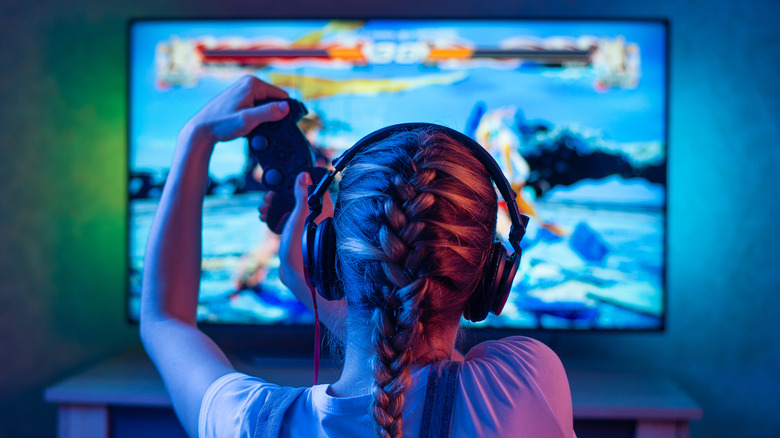When You Play Video Games Before Bed, This Is What Happens
Rather than simply being an observer of the screen, the joy of video games lies in the ability to directly interact with the story itself. With top-grossing games, such as Tetris, Minecraft, and Grand Theft Auto, having sold millions of copies worldwide over the years, video gaming remains a popular pastime (via ScreenRant).
Research proves that video games are enjoyed by people of all ages. However, a 2021 survey conducted by Statista revealed that those between the ages of 18-34 make up nearly 40% of all video game players in the U.S. When it comes to worldwide gaming, research conducted by Limelight Networks across 8 different countries determined that as of 2021, video gamers over the age of 18 spend roughly 8.5 hours a week playing video games. Some participants reported binging for several hours per day (via TechRepublic).
The Sleep Foundation recommends the average healthy adult receive anywhere from 7-9 hours of sleep nightly. With some of us dedicating so many hours a week — or per day — to video games, is it possible we're not getting enough sleep because of it?
Length of time spent gaming can influence sleep
The U.S. Centers for Disease Control and Prevention (CDC) reports that one-third of American adults aren't receiving enough sleep. Could video games be contributing to these numbers?
Those playing video games right before bed may be hindering their quality of sleep. A 2019 study published in Cureus found that playing video games prior to bed decreases time spent in REM sleep by more than 10 minutes. Adequate REM sleep is important, as this is the phase in the sleep cycle when information is consolidated in the brain, according to the Alaska Sleep Clinic.
However, some research shows that quality of sleep may be impacted more by the length of time spent playing. A 2012 study published in the Journal of Sleep Research examined the effects of video gaming on the quality of sleep in teenagers. It indicated that teens who spent 50 minutes playing video games before bed experienced minimal side effects, compared to those who spent 150 minutes of time playing and experienced a reduced quality of sleep.
Regardless of the time spent playing, Advanced Sleep Medicine Services suggests putting down electronics an hour before bedtime. The artificial light emitted from screens impacts melatonin production, or our body's sleep hormone, reducing our quality of sleep.


